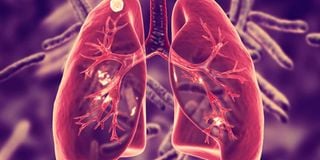20 inmates test positive for TB at Nyahururu GK prison

Some 20 inmates at the Nyahururu GK Prison in Laikipia County have tested positive for tuberculosis (TB), health officials have revealed. This follows a one-week TB screening drive conducted by a team from Laikipia Health Service, the public health department and the Nyahururu County Referral Hospital lab.
One inmate at the prison, one of the largest in the region, was found with drug-resistant TB, Laikipia TB programme coordinator David Mureithi said.
At least 700 inmates were screened.
"We have been carrying out preventive services at the facility following a spike in the disease prevalence in the last two months. We have since picked 200 samples for further scrutiny," he said.
Health officials blamed congestion at the prison as a major contributor to the spread of the killer disease.
Its capacity is 600 male inmates, but it exceeds this by more than 100.
"The number of inmates has been increasing by the day, forcing the management to transfer them to the nearby Nyandarua GK Prison in Ol Jororok constituency," said an officer.
"This is the only way we have been trying to decongest the facility."
Mr Mureithi recommended that an isolation ward be set up at the hospital to curb the spread of the disease.
"The disease is of great public health concern in congregate settings such as correctional facilities. There is a need therefore to construct an isolation ward where those found with such kind of ailments can be put to avoid spreading the disease,” he said.
Successful TB control in correctional facilities, he said, is critical due to late diagnosis, inadequate treatment, overcrowding and poor ventilation.
Health officials say repeated transfers of inmates is also to blame for greater TB infections.
Laikipia Governor Joshua Irungu has ordered that an isolation ward be set up at the hospital starting next week.
"We are dealing urgently with this matter and next week, my administration will start setting up an isolation ward in a bid to expand the facility and curb the spread of the disease," he said.
TB usually affects the lungs, but it can also attack other parts of the body, such as the brain, kidneys and spine. In most cases, it is treatable and curable.
Mr Mureithi explained that drug-resistant TB occurs when bacteria become resistant to the drugs used to treat the disease.





